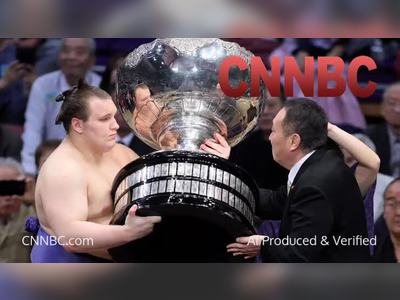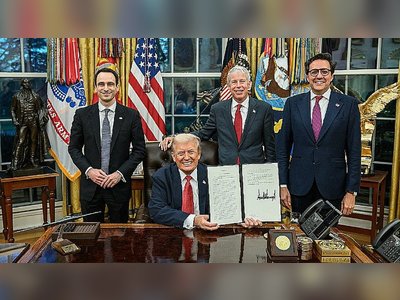The Three Letters Lifting Google and Challenging Nvidia’s Dominance in the AI-Chip Market
Google’s new Gemini 3 model, trained on its own TPU chips rather than Nvidia hardware, has ignited investor optimism and stirred real questions about Nvidia’s long-standing supremacy.
Gemini 3, the AI system unveiled by Google last week, has sharply expanded expectations across the industry.
Early performance reviews suggest it outpaces ChatGPT, which relies on Nvidia chips, opening for the first time a credible path around what many in the sector call the “Nvidia tax”.
Reactions online captured the shift.
“Holy shit.
I’ve used ChatGPT every day for three years.
After two hours with Gemini 3 I’m not going back.
It feels like the world changed, again,” wrote Marc Benioff, founder and chief executive of Salesforce, in a post on X.
With more than one million followers, Benioff frequently comments on the AI revolution, even as it poses real competitive risks to his own company.
His post was one of many praising the new Gemini release, helping push Google’s share price up six percent on Monday.
The momentum continued the next day, placing Google roughly seventy percent above its valuation at the start of twenty-twenty-five.
The surge nearly lifted Google to a four-trillion-dollar market value — a threshold previously crossed only by Nvidia, Microsoft, and Apple.
The excitement, however, runs deeper than a strong new chatbot.
Unlike its competitors, Gemini is trained and deployed on Google-designed chips rather than on Nvidia graphics processors.
Google’s processor, called the TPU, competes directly with Nvidia’s GPUs, which until now have dominated the AI market without challenge.
For more than a year, earlier versions of Gemini suffered from controversies — excessive political correctness, flawed image outputs, and historically inaccurate depictions that forced Google to suspend image generation of people and prompted an apology from chief executive Sundar Pichai.
Now, users report far higher accuracy, clearer reasoning, and stronger performance on complex tasks than ChatGPT.
Yet even this improvement is not the main story.
The central conversation driving this week’s market rally is the possibility of breaking Nvidia’s near-complete monopoly.
No one is writing Nvidia’s obituary; it remains one of the most powerful companies in the world.
But Google’s unexpected leap suggests that an alternative supply chain may finally be possible — reducing what companies describe as the “Nvidia tax,” the combination of high chip prices and dependence on Nvidia’s delivery schedule.
Nearly every major company in the world now relies on AI, and therefore on Nvidia’s hardware.
Nvidia’s chief executive Jensen Huang said last week that customer prioritization is based solely on immediate readiness to deploy GPUs, rather than on pressure from major Silicon Valley figures.
Reports in previous years claimed leaders such as Larry Ellison and Elon Musk had encouraged preferential access, though Huang insists allocation decisions are pragmatic, not political.
Investors, swinging between optimism and anxiety about the future of AI, took Google’s progress as a sign that even a small amount of competition could ease the enormous financial commitments required of companies such as Meta, Amazon, and Microsoft.
Fuel was added when it emerged yesterday that Meta is considering switching to Google’s chips in its data centers starting in twenty-twenty-seven.
The news gave real weight to the idea of an alternative supply chain — and sent many readers to ChatGPT or Gemini to ask a simple question: what exactly is a TPU?
Google launched the first TPU in twenty-eighteen to support internal cloud infrastructure, storage, search, and eventually machine-learning workloads.
As AI advanced, Google adapted the TPU for large-language-model training.
This specialization now gives it a significant advantage over Nvidia’s GPU architecture, originally designed for high-end graphics in gaming rather than advanced mathematical computation.
GPUs proved highly adaptable to AI, but TPUs were built for it from the start.
As a result, Google’s chip offers higher throughput — more operations per second — and lower energy consumption.
With global shortages of Nvidia hardware and increasing constraints on energy infrastructure, including new nuclear-power projects in the United States to support AI data centers, the TPU’s efficiency matters.
Its benefits apply not only to training but also to inference, the stage at which AI models generate outputs.
The fear that Nvidia may lose absolute control of the AI-chip market contributed to a five-percent drop in Nvidia’s share price even before U.S. markets opened, followed by another five-percent fall later in the day.
Nvidia’s valuation now stands near four-point-one trillion dollars — not far from Google’s.
After these shifts, the companies’ forward earnings ratios have moved closer together, making Nvidia appear far cheaper than it did just a week ago.
Still, Google’s internal demand for TPUs is enormous, and it is unclear how quickly or widely it will make the chips available externally.
Maintaining independence from Nvidia may become a competitive advantage, especially in cloud services where Google still trails Amazon and Microsoft.
A new domino effect is also emerging behind the scenes among companies that design and manufacture chips.
While attention focused on Google’s rise and Nvidia’s dip, other firms saw significant movement.
Chief among them was Broadcom, whose share price jumped eleven percent on Monday, bringing its valuation close to two trillion dollars.
Broadcom co-develops Google’s chips and would benefit directly if Meta or others adopt TPUs.
Another company gaining visibility is Marvell, a smaller competitor that also develops custom chips similar to Google’s TPU and specializes in high-speed data-center connectivity — a role comparable to that once held by Mellanox before Nvidia acquired it.
Chip manufacturers in East Asia, including TSMC, Samsung, and Micron, are likewise positioned to benefit from Google’s deeper entry into the semiconductor race.
For them, whether they produce chips for Google or Nvidia matters little; either path brings new business in a market where demand shows no sign of slowing.
Early performance reviews suggest it outpaces ChatGPT, which relies on Nvidia chips, opening for the first time a credible path around what many in the sector call the “Nvidia tax”.
Reactions online captured the shift.
“Holy shit.
I’ve used ChatGPT every day for three years.
After two hours with Gemini 3 I’m not going back.
It feels like the world changed, again,” wrote Marc Benioff, founder and chief executive of Salesforce, in a post on X.
With more than one million followers, Benioff frequently comments on the AI revolution, even as it poses real competitive risks to his own company.
His post was one of many praising the new Gemini release, helping push Google’s share price up six percent on Monday.
The momentum continued the next day, placing Google roughly seventy percent above its valuation at the start of twenty-twenty-five.
The surge nearly lifted Google to a four-trillion-dollar market value — a threshold previously crossed only by Nvidia, Microsoft, and Apple.
The excitement, however, runs deeper than a strong new chatbot.
Unlike its competitors, Gemini is trained and deployed on Google-designed chips rather than on Nvidia graphics processors.
Google’s processor, called the TPU, competes directly with Nvidia’s GPUs, which until now have dominated the AI market without challenge.
For more than a year, earlier versions of Gemini suffered from controversies — excessive political correctness, flawed image outputs, and historically inaccurate depictions that forced Google to suspend image generation of people and prompted an apology from chief executive Sundar Pichai.
Now, users report far higher accuracy, clearer reasoning, and stronger performance on complex tasks than ChatGPT.
Yet even this improvement is not the main story.
The central conversation driving this week’s market rally is the possibility of breaking Nvidia’s near-complete monopoly.
No one is writing Nvidia’s obituary; it remains one of the most powerful companies in the world.
But Google’s unexpected leap suggests that an alternative supply chain may finally be possible — reducing what companies describe as the “Nvidia tax,” the combination of high chip prices and dependence on Nvidia’s delivery schedule.
Nearly every major company in the world now relies on AI, and therefore on Nvidia’s hardware.
Nvidia’s chief executive Jensen Huang said last week that customer prioritization is based solely on immediate readiness to deploy GPUs, rather than on pressure from major Silicon Valley figures.
Reports in previous years claimed leaders such as Larry Ellison and Elon Musk had encouraged preferential access, though Huang insists allocation decisions are pragmatic, not political.
Investors, swinging between optimism and anxiety about the future of AI, took Google’s progress as a sign that even a small amount of competition could ease the enormous financial commitments required of companies such as Meta, Amazon, and Microsoft.
Fuel was added when it emerged yesterday that Meta is considering switching to Google’s chips in its data centers starting in twenty-twenty-seven.
The news gave real weight to the idea of an alternative supply chain — and sent many readers to ChatGPT or Gemini to ask a simple question: what exactly is a TPU?
Google launched the first TPU in twenty-eighteen to support internal cloud infrastructure, storage, search, and eventually machine-learning workloads.
As AI advanced, Google adapted the TPU for large-language-model training.
This specialization now gives it a significant advantage over Nvidia’s GPU architecture, originally designed for high-end graphics in gaming rather than advanced mathematical computation.
GPUs proved highly adaptable to AI, but TPUs were built for it from the start.
As a result, Google’s chip offers higher throughput — more operations per second — and lower energy consumption.
With global shortages of Nvidia hardware and increasing constraints on energy infrastructure, including new nuclear-power projects in the United States to support AI data centers, the TPU’s efficiency matters.
Its benefits apply not only to training but also to inference, the stage at which AI models generate outputs.
The fear that Nvidia may lose absolute control of the AI-chip market contributed to a five-percent drop in Nvidia’s share price even before U.S. markets opened, followed by another five-percent fall later in the day.
Nvidia’s valuation now stands near four-point-one trillion dollars — not far from Google’s.
After these shifts, the companies’ forward earnings ratios have moved closer together, making Nvidia appear far cheaper than it did just a week ago.
Still, Google’s internal demand for TPUs is enormous, and it is unclear how quickly or widely it will make the chips available externally.
Maintaining independence from Nvidia may become a competitive advantage, especially in cloud services where Google still trails Amazon and Microsoft.
A new domino effect is also emerging behind the scenes among companies that design and manufacture chips.
While attention focused on Google’s rise and Nvidia’s dip, other firms saw significant movement.
Chief among them was Broadcom, whose share price jumped eleven percent on Monday, bringing its valuation close to two trillion dollars.
Broadcom co-develops Google’s chips and would benefit directly if Meta or others adopt TPUs.
Another company gaining visibility is Marvell, a smaller competitor that also develops custom chips similar to Google’s TPU and specializes in high-speed data-center connectivity — a role comparable to that once held by Mellanox before Nvidia acquired it.
Chip manufacturers in East Asia, including TSMC, Samsung, and Micron, are likewise positioned to benefit from Google’s deeper entry into the semiconductor race.
For them, whether they produce chips for Google or Nvidia matters little; either path brings new business in a market where demand shows no sign of slowing.










